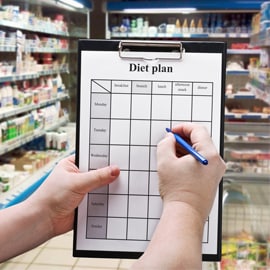After weight loss surgery, everyone follows a similar timeline of dietary changes. This guide page will outline the basic changes you can expect to make after getting weight loss surgery. This timeline is only a supplement—not a substitution—to your weight loss surgeon’s guidelines.
Always follow the directions of your weight loss surgeon when making dietary choices after weight loss surgery.
Body Changes and Your Diet

Whether you undergo Lap Band, gastric bypass or sleeve gastrectomy surgery, the first few days following your operation will be similar. You will be restricted to a liquid diet while your body heals from surgery. This stage lasts for a period of about two weeks. Your weight loss surgeon will let you know when you are ready to begin transitioning away from your liquid diet.
It will take several months for your body to acclimate to the changes in your stomach enough to handle regular foods. During that time, you will make gradual dietary changes. Following your weight loss surgeon’s guidelines during this time is important to allow your body to heal, as well as for your weight loss efforts.
Weight Loss Surgery Dietary Timeline
- Stage 1—Clear Liquids. This stage lasts one to three days following your operation, depending on the type of surgery. During this time, your stomach cannot yet hold solid food. Acceptable liquids during this period include juices, water, coffee, broth and approved protein shakes. Your weight loss surgeon may recommend a multivitamin to prevent nutritional deficiencies.
- Stage 2—Full Liquids. This stage will last for one to two weeks after weight loss surgery. During this time you can have fruit and vegetables sauces, vegetable juice, sugar-free yogurt and approved protein shakes.
- Stage 3—Pureed Foods. This stage will last up to three weeks following weight loss surgery. During this time, you can begin to eat regular foods as long as they are mashed and easy to digest. These foods include beans, eggs, tofu, applesauce, yogurt and mashed potatoes.
- Stage 4—Soft Foods. This stage will last up to six weeks following your weight loss surgery. At this time you can begin to eat some fresh fruits like bananas and orange slices, cooked vegetables, beans and baked chicken. During this stage foods should be as moist as possible.
- Stage 5—Solid Foods. The return to solid foods usually happens around 10 weeks following weight loss surgery. During this stage you can start to eat healthy foods that are part of your post-surgery meal plan, like lean meats and other low fat foods.
The transition to solid foods after weight loss surgery is a slow one. Don’t rush the process. If you have any questions about your diet following weight loss surgery you should contact Dr. Taylor.
Suggested Reading
Emotional Eating After Surgery
The Best Foods for Protein
Managing Special Occasions after Weight Loss Surgery
Also In This Section
- Fall for an Indoor Weight Loss Workout
- Healthy at Home
- A World of Weight Loss
- The Skills of Weight Loss Success
- Beat the Heat with Summer Fitness Tips
- The Importance of Water to Weight Loss
- Tips for Exercise after Bariatric Surgery
- Which Medications Should You Avoid After Bariatric Surgery?
- 4 Tips for Quick Weight Loss
- Driving Habits and Obesity

